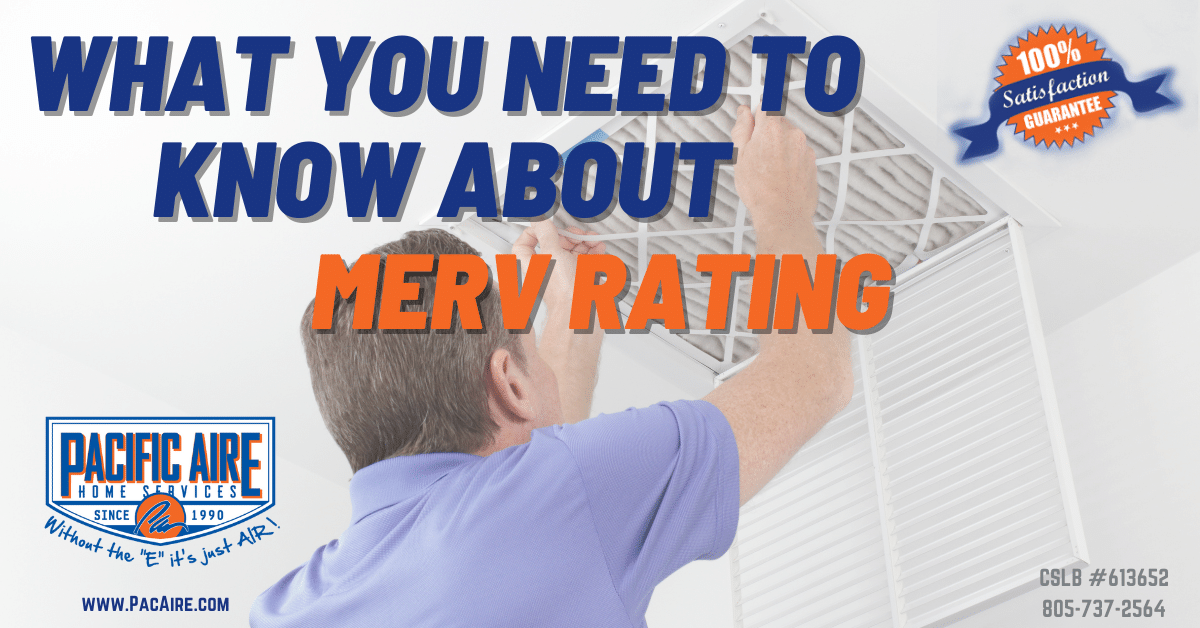It’s surprising to learn how many allergens and contaminants we breathe in when we’re indoors. You may think the outdoors should be dirtier because you keep your home clean but the truth is air quality can be 5x worse indoors! There are several reasons for this, including inadequate ventilation, the increasing use of synthetic materials, and inadequate air filtration.
Regularly changing your air filters is one way to improve your home’s air quality. MERV ratings are found on most air conditioning and heating system filters and are important for determining filter efficiency.
What Are MERV Ratings and what do they mean? How do you choose the best air filter for your family? Customers often ask these questions when shopping for air filters. Continue reading to learn more about MERV ratings.
What is MERV rating?
MERV is short for minimum efficiency reporting value. It measures the air filter’s efficiency in eliminating the particles from the air passing through it. Filters have MERV ratings ranging from one to twenty. A higher MERV rating indicates greater filtration efficiency.
It is important, however, to remember that a higher score isn’t always necessary or appropriate for your home. You can make an informed decision about which filters are best for your home and lifestyle by learning more about MERV ratings.
The MERV rating also indicates the size of the pores in the filter. Lower scores indicate larger pores. This means that smaller particles can easily pass through and circulate throughout the home when the air conditioner and heating system is on. When the score is higher, the pores are smaller meaning the filter allows fewer particles to pass through.
A standard HVAC system comes equipped with a filter that has a MERV rating between six and eight. Typically, these standard residential HVAC systems are able to effectively remove airborne contaminants with these filters. As per the American Society of Heating, Refrigerating and Air-Conditioning Engineers (ASHRAE), this type of filtration helps ensure the air in your home stays cleaner.
MERV Rating Categories
MERV ratings range from 1 to 20. It is divided into three categories:
- Low-efficiency (Around 1 to 4) – This type of filter eliminates sand dust, pollen, dust mites, insects and some of their waste and textile fibers. These filters are commonly found in residential HVAC units, window air conditioning systems, and as commercial building pre-filters. (Around 5 to 6) – These types of filters eliminate mold, spores, dust, lint, cement dust, pet dander. You can find them in industrial workspaces including commercial and residential space.
- Medium-efficiency (Around 7 to 13) – Ideal for removing dust and contaminants from a residential space.
- High-efficiency (Around 14 to 16) – Usually used in hospitals, restaurants, and other public places. The reason why they are not recommended for residential use is that they significantly restrict airflow. (Around 17 to 20) – The highest MERV rating. These filters are found in clean rooms for the production of sensitive electronics and pharmaceuticals. They can filter out viruses, carbon dust and pollutants as small as smoke particles.
Consider filters with a MERV rating of 7 to 13. Consult your HVAC service technician before choosing a higher MERV rating. Your heating and air conditioning system will most likely need to be modified in order to use high-efficiency filters.
Choosing the Right MERV for Your Home
It may appear that MERV filters with a higher score are better, but a MERV rating that is too high for residential homes will result in inefficiency and higher utility bills. If the MERV rating is higher, the central air conditioning system has to work twice as hard to condition and filter the same amount of air.
Below are scenarios when you should use a MERV-16 rated filter:
- If you or anyone in your family is allergic to airborne particles or pathogens.
- When you have small children or elderly whose health are affected by poor air quality.
- When there is someone at home who has allergies or weakened immunity.
- In need of regular, extra-strong filtering in your home.
A Budget & Economically Friendly Way to Improve Air Quality In Your Home
There is a more efficient and economical option available for those seeking high-quality indoor air.
Our air purification system is a revolutionary new system designed to eliminate indoor air quality risks. We, at Pacific Aire, install and maintain air scrubbers to reduce particulate matter, odors, and organisms in the air. Using air scrubbers will help reduce stress on your original filters and purify indoor air quality without extra effort. We offer no-cost estimates and Same-Day installation for Air Scrubbers.


